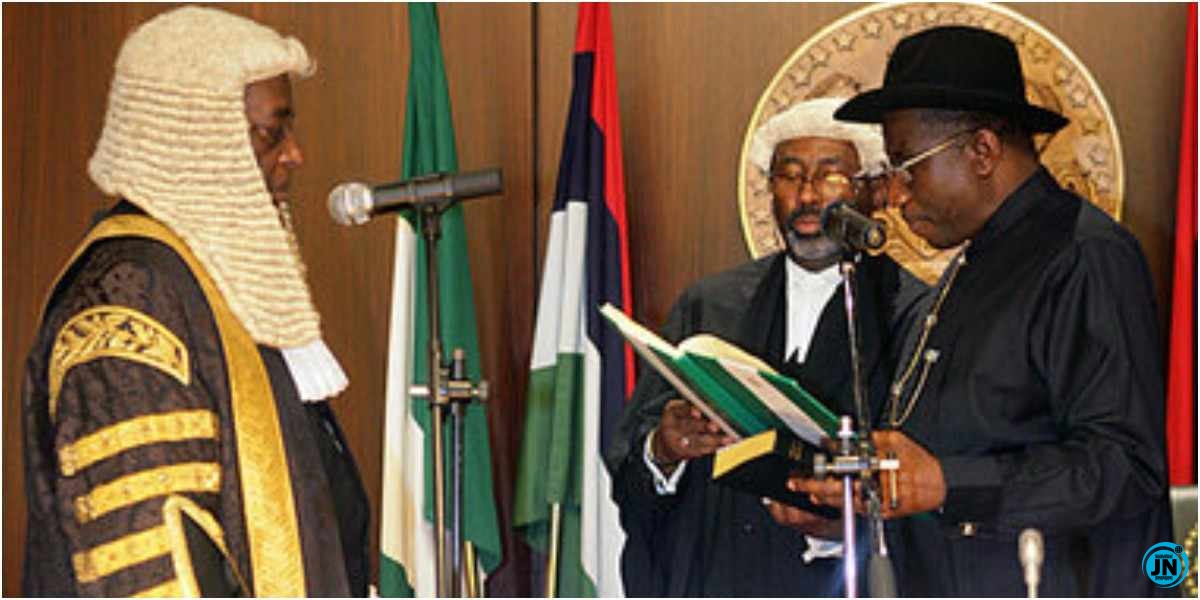
A new legal development has emerged as a fresh suit has been filed before the Federal High Court in Abuja, aiming to stop former President Goodluck Ebele Jonathan from contesting in the upcoming 2027 presidential election. The case has stirred political discussions across the country, reigniting debates about the constitutional limit of presidential tenure in Nigeria.
The suit, instituted by constitutional lawyer Johnmary Chukwukasi Jideobi, challenges Jonathan’s eligibility to contest again, citing provisions of the 1999 Constitution of the Federal Republic of Nigeria (as amended). The legal document, marked FHC/ABJ/CS/2102/2025, calls for the court to issue a perpetual injunction that would bar Jonathan from presenting himself to any political party for nomination as a presidential candidate in the 2027 general elections.
The case also seeks to prevent the Independent National Electoral Commission (INEC) from accepting or publishing Jonathan’s name as a valid presidential candidate, should any political party attempt to field him in the next election. The Attorney General of the Federation was joined as the third defendant, with a request for the court to mandate the office to enforce full compliance with any ruling issued on the matter.
According to the plaintiff, the central question before the court is: “Whether in view of the combined provisions of Sections 1(1), (2) & (3) and 137(3) of the 1999 Constitution, as amended, the 1st Defendant — Goodluck Ebele Jonathan — remains eligible under any circumstances whatsoever to contest for the office of the President of the Federal Republic of Nigeria.”
Based on this, Jideobi is seeking several declarations from the court, including: “A declaration that upon an intimate reading and full interpretation of Sections 1(1), (2) & (3) and 137(3) of the Constitution, the 1st Defendant is constitutionally ineligible to stand for or occupy the office of the President of Nigeria.”
He further sought “A declaration that in view of the said constitutional provisions, the 2nd Defendant (INEC) lacks the power to accept or publish the name of the 1st Defendant as a presidential candidate in 2027 or in any subsequent elections.”
In addition to the declaratory reliefs, the plaintiff requested several orders of injunction — including “An order of perpetual injunction restraining the 1st Defendant (Jonathan) from presenting himself to any political party in Nigeria for nomination as a presidential candidate,” as well as “An order restraining INEC from accepting or publishing Jonathan’s name as a presidential candidate in 2027 and beyond.”
The suit also asks the court to compel the 3rd Defendant, the Attorney General of the Federation, to ensure that the judgment of the court — once delivered — is fully implemented and enforced nationwide.
In a supporting affidavit, one Emmanuel Agida, described as a strong advocate for the rule of law, stated that allowing Jonathan to run again would violate the constitutional limit of eight years permitted for any Nigerian president. He explained: “If the 1st defendant wins the 2027 election, his tenure will span from 2027 to 2031. When combined with his previous time in office, it would exceed the maximum constitutional limit of 8 years.”
He further emphasized that the framers of the Constitution designed the presidential term limits to safeguard democracy and prevent excessive power concentration. Therefore, any attempt by Jonathan to return to the presidency, he argued, would undermine the rule of law and threaten democratic stability.
As of now, the Federal High Court has yet to deliver a ruling on the matter, and proceedings are still ongoing. The suit has since sparked intense reactions among political observers, lawyers, and citizens across the country, with some calling it a necessary move to uphold constitutional order, while others argue that Jonathan’s 2010–2015 tenure followed unique circumstances that may exempt him from the two-term restriction.
Observers are watching closely as the legal battle unfolds, as its outcome could significantly shape the political landscape ahead of the 2027 general elections.